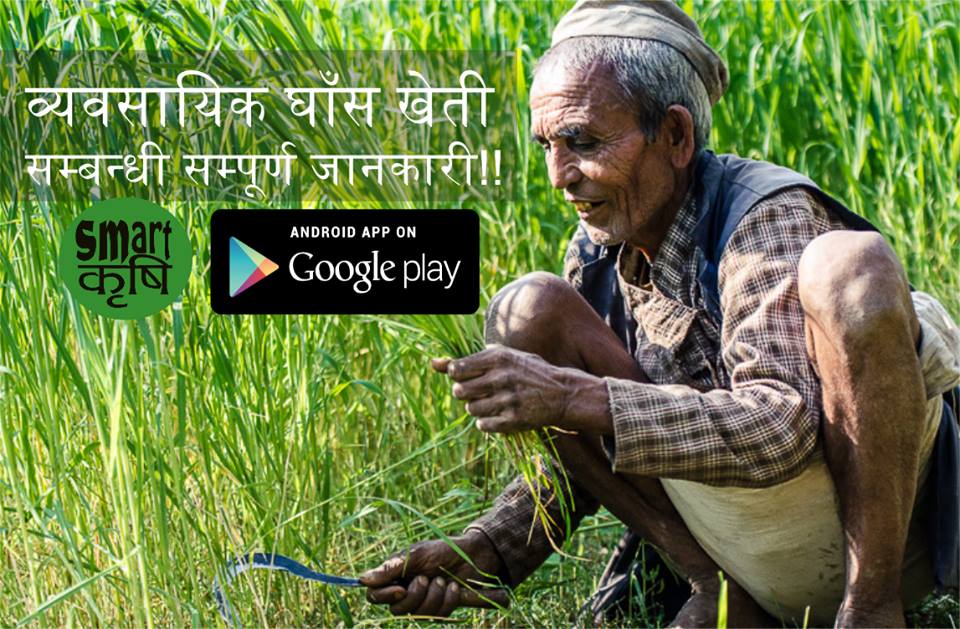INTERVIEW WITH ANIL REGMI, CO-FOUNDER OF ‘SMART KRISHI’: A MOBILE APP SUPPORTING FARMERS ACROSS NEPAL WITH INFORMATION
According to the Nepalese Performance Portfolio Review (2015), agriculture is the main source of food, income and employment 65.7% of the Nepalese population. “SMART KRISHI” is a mobile app for android helping many farmers to get the information about types of soil, improvised seeds, fertilizers, pesticides, weather forecast, modern farming processes, modern technologies for irrigation etc. and to get connected to agriculture experts. Today the app has 53500+downloads 15000+ active users and 1500+ daily users and its facebook page has 3,16,000+ fans.
We sat down with Anil Regmi, the 25 year old Nepali person behind ‘Smart Krishi’, who is committed to help the Nepalese farmers to increase their production and access to market by minimizing the information gap in the agricultural sector. Born in Lamjung district, Anil holds a Bachelors of Engineering from the National College of Engineering, Satdobato, Kathmandu.
How has the idea of creating Smart Krishi come about? What inspired you?
After graduation, I could not see my future career in Nepal and decided to apply to study abroad. For that, I took the Graduate Record Examinations tutorial class and spent the rest of the time doing nothing. One day, I learned about NCELL APP CAMP, The biggest Mobile App Development Conclave in Nepal. It is a platform for mobile app developers and other mobile enthusiasts to bring forward their creative and innovative mobile app ideas, products and prototypes that have potential to stand out as sustainable businesses. I thought of utilizing my leisure time and the knowledge by participating in the Camp and presented the idea of a mobile app to minimize the information gap for the Nepalese farmers. Unfortunately, my idea did not get selected.


After this rejection I couldn’t drop the idea, because of the strong need to do something to address the poor agriculture situation in Nepal. Finally, after two months of hard work, I managed to launch the App in January, 2015.
So you see lack of information as one of the key problems in agriculture today? Could you tell us more about the issues farmers face?
I am originally from Lamjung district. My parents are teachers in a local school and also a part- time vegetable farmers. I grew up seeing the struggles of farmers in my village, especially the difficulties in finding the right information on agriculture. They predicted the weather by looking at the sky and most of the time the prediction failed. They could hardly think of any agricultural crops other than rice, wheat, millet and maze. As a result, despite spending 12 months full time working on their lands, they could hardly get enough corps to feed themselves for 9 months. To overcome this gap, I saw how many young farmers were forced to migrate to India and other countries for seasonal work.
Nepal is the place of biodiversity and the country is divided into three regions i.e. hill, Terai and mountain area and farmers can grow different types of agricultural products in this three different regions. In order to to farm professionally and be able to earn a decent living, traditional farming will not work. Farmers need to properly plan what to grow, how much to grow and understand the required processes and profit margin. For professional farming, one must know about the about type of soil, improvised seeds, fertilizers, pesticides, weather forecast, modern farming processes, modern technologies for irrigation etc.
What was the app development process and what challenges you resolved on the way?
Being an engineer in electronic and communication, initially I thought that app development was the most challenging part, but later when I started reaching out to various government offices to find the right contents for the app I realized that there were bigger challenges. For example, I didn’t have any idea about how to make real farmers use the App. Then I met a Nepalese computer engineer, ex-employee in Microsoft and student of PhD in the USA, Mr. Bikalpa Neupane through a popular facebook group among the Nepalese startup community called “Entrepreneurs for Nepal”. He mentored me on both the technical aspects and also on my communication and personal skills.
We registered the company “Smart Krishi” in the Department of Small and Cottage Industries and got some support from the Nepal Agricultural Research Council (NAARC) in terms of getting contents for the APP. We partnered with local Vet shops in villages to promote the app, in order to reach farmers coming there for various services. We promoted the App through facebook and other social media and the response of the people was overwhelming. This helped us to keep on moving forward despite having various challenges.
We are earning some money from google adds and from the facebook page of “Smart Krishi” by posting various adds from tractor companies, fertilizer Companies and Training. However, we are still struggling to become financially sustainable.
Can you tell us a little bit more about the “Smart Krishi” app? What are the features?
“Smart Krishi” is an application for any android smart phone, providing information related to agriculture. “Smart Krishi” works with farmers, agro product traders, content providers, extension services and industry bodies to provide agriculture related services across the whole agricultural supply chain. The app provides details under various sections such as horticulture, agronomy, entomology, livestock farming etc., so that they can get information easily, from establishment to the types of pesticides to be used, and the measures to eliminate diseases and pests etc.
Similarly, this App also has a farmer’s community, where farmers can share their ideas, farming tips and problems. It also has a section with agricultural news and success stories to motivate other farmers. The content can also be viewed in offline mode. Farmers can send their location and can get the details of the crops and farming that can be done in that location.
Additionally, there are other features such as market prices of various agricultural products, weather information, Question and Answers with agricultural experts, an agriculture library, information about trainings, fertilizers, seeds, government plans on agriculture etc.Who is using the app? Is it accessible to old age people or illiterate ones who are mainly engaged in farming?
In the name of ‘gift from abroad’, people in village areas are also getting and using smart phones and they are able to use “Smart Krishi” with the help of educated persons in the village. And because of the good results, elderly people are also adopting the new farming techniques. Young people, who are new starters in the agriculture sector are also using the app. Specially, migrant workers, who are planning to contribute and work in the agricultural sector after returning back home are enthusiastic about it. Few shared with me on social media how the App has motivated them to think about their abandoned agricultural fields back home.
What other opportunities for innovation do you see in agriculture? How can young people contribute?
I believe that there are more opportunities in growing cash crops such as fruits and herbs, rather than the traditional way of harvesting paddy and wheat everywhere. Products such as kiwi fruit, cardamom, dragon fruit, chiraito, paulownia, bodhichitta etc. have high value in the market and Nepal has the types of climate and lands to grow these. Also, various types of vegetables, spices, dairy, poultry, fish etc. have huge market potential inside and outside the country.
I think young people can contribute to the agricultural sector, by not wasting their time on the unproductive use of social media and on entertainment. Instead of abandoning their agricultural fields in the village, they should use these for farming. And the role of young people can be in contributing to produce more local products, rather than get influenced by the thought “imported is always better”.
What have you learnt from building Smart Krishi and what recommendations would you give to others?
By building “Smart Krishi” I have realized that by engaging people in different kinds of agricultural like growing different type of crops in Nepal would be more beneficial to both the farmer and consumer. Before starting with farming, proper planning is needed focusing on growing products, which currently are imported in Nepal.
What are your future goals? Where do you see Smart Krishi in 10 years?
“Smart Krishi” was only launched for android phones, so we are developing the version for IOS also. In 10 years, I want to see this application used by every farmer for their own benefit and to produce more agricultural products.
How do you imagine the agriculture sector in Nepal in future?
I want Nepal to be an exporter of herbs, grains etc. I want every farmer in Nepal to get good marketing facilities and to use new techniques of farming and high production.
By listening to Anil Regmi we can feel the importance of new innovation and also find opportunities in the field of agriculture. Anil Regmi is a young person who has contributed a lot in his young age and his life experience can be an inspiration and motivation for young people. Because of “Smart Krishi”, farmer in Nepal are getting lots of benefits and are getting motivated to think about innovation, growth and development of Nepal rather then choosing foreign employment. If all the youth would come together, then we can change the course of development in Nepal. So let’s think creatively and for the betterment of our people!
Bikesh Maharjan
K and K international College
Bachelors in Social Work
